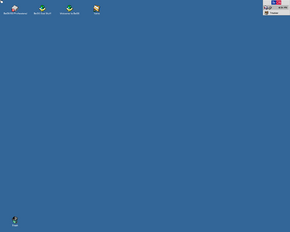BeOS
BeOS is a discontinued operating system, first developed by Be Inc. It was originally developed for AT&T Hobbit-based systems but later ported to the PowerPC-based BeBox. It was later ported to PowerPC-based Macintosh models as well as the x86 architecture. It was discontinued in 2001 due to poor market share. Be Inc. later shifted to internet appliances and later bought by Palm Inc. It was succeeded by the yellowTAB Zeta, and OpenBeOS (which later became the Haiku project).
BeOS in emulators[edit | edit source]
The operating system is notorious for its usage of install media with multiple tracks. This makes it harder to install it in hypervisors, as converting the disc image to a format designed to only store a single track such as ISO 9660 will result in a boot error. Some tools are also known to convert the image into a multi-track format consumable by a VM, although they discard the track information in the process and write a cue file with a single track, leading to the same error. As of 2024, the recommended emulator for BeOS (after R3) is 86Box, as it's not possible to emulate earlier PowerPC-based versions.
Version list[edit | edit source]
| Version | Release date |
|---|---|
| BeOS DR8 | 1996-09 |
| BeOS PR1 | 1997-06 |
| BeOS PR2 | 1997-10 |
| BeOS R3 | 1998-03 |
| BeOS R3.1 | 1998-06 |
| BeOS R3.2 | 1998-07 |
| BeOS R4 | 1998-11 |
| BeOS R4.5 | 1999-06 |
| BeOS R5 | 2000-03 |
| BeOS R5.1 | 2001-11 |

